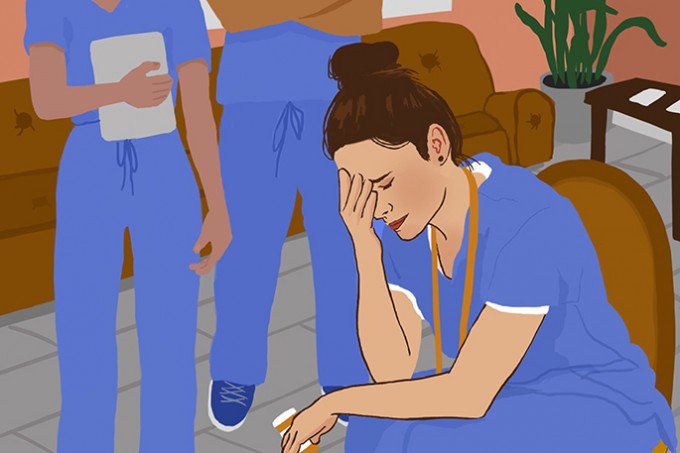Feature
When the Nurse is an Addict: Part One
Advice from a real-life Nurse Jackie on burnout, addiction and finding your way back

Nurses don’t plan to become addicts. We often deny our risk, but our profession’s combination of high stress, burnout and access to drugs can make us at least as susceptible to addiction as the general public. I’m living proof.
Crashing and Burning
I clutched two plaques to my chest, beaming with pride as I stood tall with my fellow graduates in a large auditorium. It was 2005, and I was advancing with honors as a registered nurse. I had already won a “Nursing Student of the Year” award for my ability to overcome adversity.
My reputation — hardworking and compassionate — followed me to my first hospital job. Thriving on the fast pace and constant challenges in an acute care telemetry department, I quickly progressed from preceptor to charge nurse and later unit supervisor. I jumped at opportunities to serve on committees and volunteer for community outreach. I was on the fast track to leadership.
What I didn’t forecast was a descent into professional burnout and substance abuse that nearly spelled the the end of my career.
My reality as an esteemed critical care nurse was ripped out from under me on May 17, 2016, when my manager and a human resources representative led me into a back room and confronted me with accusations of diverting narcotics and working under the influence. I balked at their demands for a urine analysis, but I was stalling. I knew the analysis would glow with a dirty truth: Addicted to opiates and alcohol, I’d broken the vows of integrity I made when I received my degree. Eventually, after giving them their sample, I walked away from the campus and back to my car, alone, terrified and wracked with shame and despair.
Yet, I was also overwhelmed with relief. I no longer had to live a lie. I no longer had to keep up a facade of strength and capability. I could finally admit I was suffering and desperately needed support.
Numbing the Pain
None of us is wholly immune to the danger of addiction. Excellent grades, certifications and professional awards offer little protection if we find ourselves with more stressors than coping mechanisms.
A common theme among nurse addicts is self-medication, and I was no different. Before I ever took daily drinks or habitually popped pills, I had become a burned-out nurse, exhausted and in pain. I had single-parenthood pressures and a second divorce; overreaching overtime hours in the ICU and a part-time clinical instructor role; and the added stress of caring for my terminally ill father at home.
I also had a legitimate Vicodin prescription for migraines. It became a recipe for drug-addiction disaster.
In a 2017 Kronos survey, 93 percent of nurses said work leaves them physically and mentally exhausted, a major risk factor for substance abuse. Sixty-three percent reported suffering job-related burnout.
For me, professional burnout was only one part of the picture. I pushed myself relentlessly in every aspect of my life, neglecting self-care. Internal and external pressure to be the best employee, daughter, mom and partner felt insurmountable. Because I lacked effective coping skills, Vicodin became one of the few tools that relieved tension while synthetically (and temporarily!) boosting my energy.












